Feeling cautiously optimistic about American democracy
This is still the country I grew up in.
I went to a protest today, for the first time in years. It was the “No Kings” protest in San Francisco, part of a nationwide series of protests against Donald Trump’s authoritarianism. The protests reportedly drew about 5 million people across the country — about the same as the Women’s March in 2017.
In almost every city, protests were completely peaceful — the only city to see significant violent clashes between protesters and police was Los Angeles, where leftist career-activists have gathered in recent days. Certainly, the SF protest I attended was totally nonviolent — I didn’t even see a single police officer. No stores were looted, no windows smashed, no cars overturned, no bricks thrown.
This was also the single most patriotic protest I’ve ever been to. Tons of people were carrying American flags — they absolutely overwhelmed the number of Palestine, Mexico, trans, Ukraine, and other flags. Many of the signs referenced the Constitution, the Statue of Liberty, or the American Revolution of 1776:

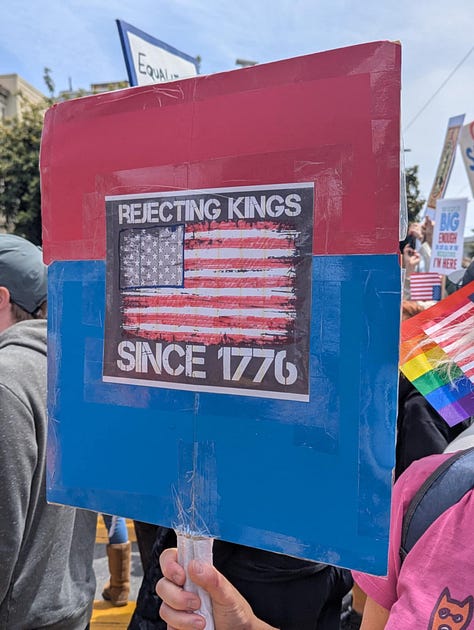
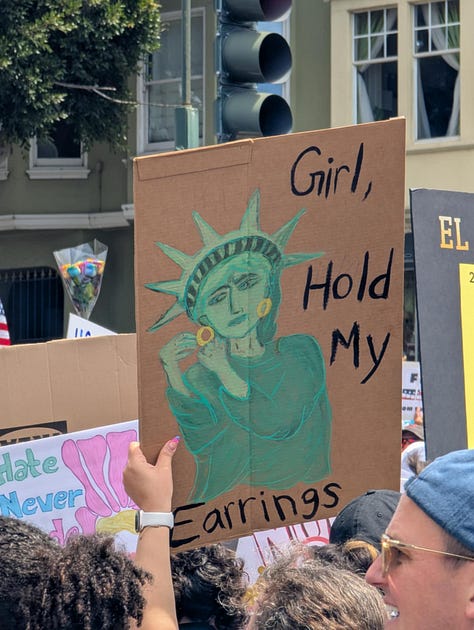
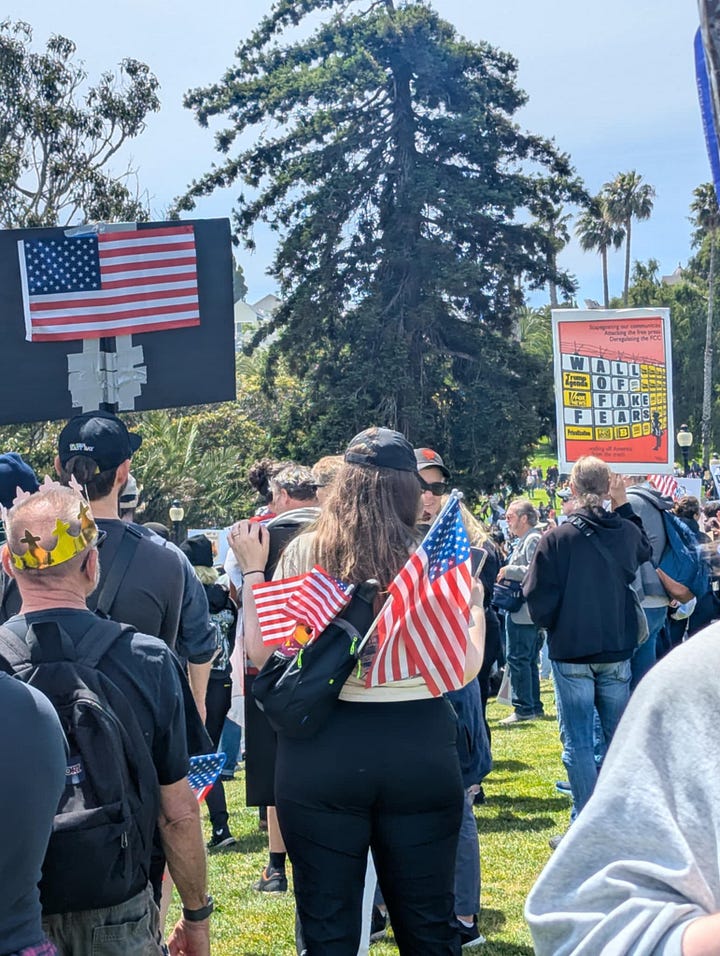
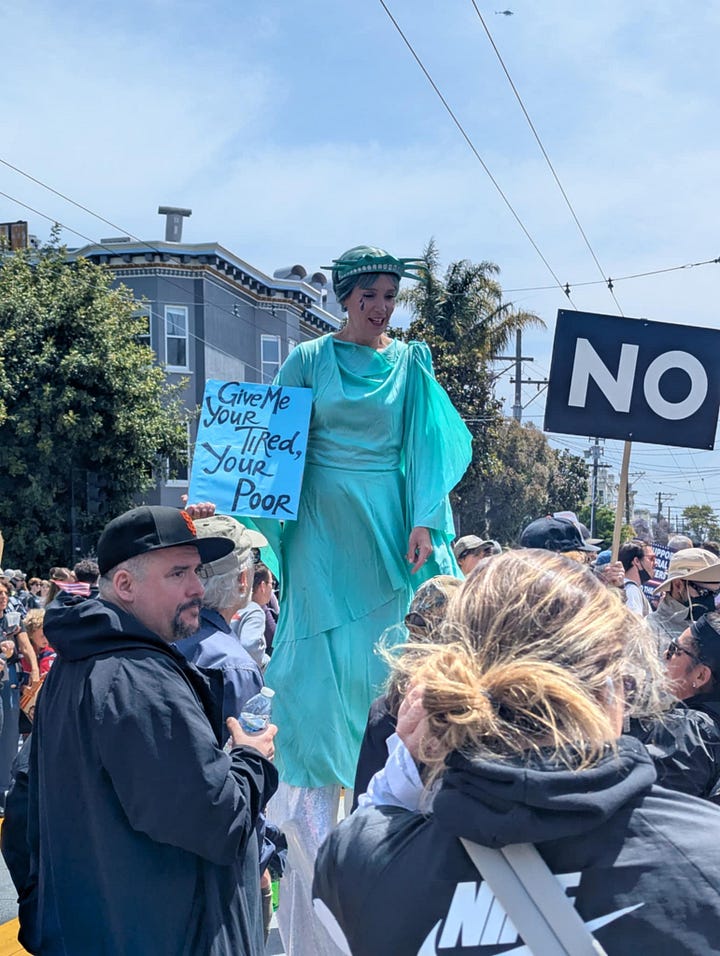
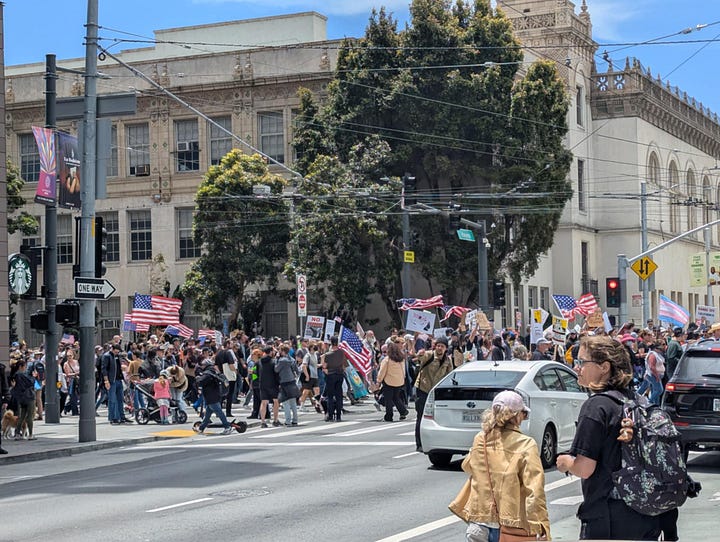

Here are some images of other protests from around the country; you can see they all look pretty much the same as the one in San Francisco.
Notably, there was none of the angry energy and racial grievance of the BLM protests of summer 2020, nor the anti-Americanism of the Palestine protests. There was no 1619 or 1948, only 1776. It was all just liberty and democracy and the Constitution. My overpowering impression was that this was the country I grew up in. These were the things that Americans valued — or at least, said they valued — when I was young.
It was a stunning victory for message discipline among the anti-Trump opposition. The current cycle of protest kicked off with small but violent riots against ICE in Los Angeles, in which a few rioters waved Mexican flags over burning cars. Afterward, many liberal commentators — including myself — denounced the imagery of using Mexican flags to protest mass deportations, and called for protests to remain peaceful.
A lot of progressives raged at us liberal tone police on social media, declaring that protesters should fly whatever flag they damn well choose, and that violence was an acceptable mode of resistance against fascism. The Washington Post ran an op-ed defending the use of the Mexican flag, and the New York Times called it a potent protest symbol. And yet the tone policing worked. I saw almost no Mexican flags in today’s demonstration, and the No Kings protests remained peaceful.
The result has been something of a public relations coup. The surprisingly large, peaceful, and patriotic protests compared favorably to Trump’s birthday military parade, which was poorly attended, dismal, and boring (and somehow included weird ads for Coinbase). Most Americans were leery of the parade, which seemed like the kind of self-glorifying, wasteful, tasteless display that a tinpot dictator would do — the perfect foil to a protest movement calling itself “No Kings”.
I’m also starting to develop a nuanced understanding of the relationship between riots, tone policing, and peaceful protest. In 2020, widespread rioting — although not nearly as bad as in the 1960s or L.A. 1992 — seemed to do long-term damage to the progressive cause in America, and spelled the end of the BLM movement. Certainly, research seems to show that riots are usually counterproductive — people don’t like chaos in the streets.
And yet it seems as if it might have partially been the threat of urban disorder that caused Trump to blink and back off on the most egregious of Stephen Miller’s aggressive deportation efforts. Although the justification he gave for his latest climbdown was economic, the timing suggests that the small L.A. riots might also have spooked him:
President Trump admitted Thursday that his own immigration crackdown is gutting key American industries — and pledged that “changes are coming” to the White House’s policies…In a post on Truth Social, Trump acknowledged that his deportation campaign is hurting key sectors of the American economy, including farming and hospitality.
“Our great Farmers and people in the Hotel and Leisure business have been stating that our very aggressive policy on immigration is taking very good, long time workers away from them, with those jobs being almost impossible to replace,” Trump wrote…“This is not good. We must protect our Farmers, but get the CRIMINALS OUT OF THE USA. Changes are coming,” he said.
Trump addressed the Truth Social post later Thursday afternoon, telling reporters at the White House: “Our farmers are being hurt badly by, you know, they have very good workers. They’ve worked for them for 20 years.”…“They’re not citizens, but they’ve turned out to be, you know, great. And we’re going to have to do something about that,” Trump said of undocumented migrants…“We can’t take farmers and take all their people and send them back because they don’t have maybe what they’re supposed to have, maybe not. And you know what’s going to happen and what is happening?”
The president added that migrant laborers have in some cases “been there for 20, 25 years and they’ve worked great. And the owner of the farm loves them and everything else.”…“And then you’re supposed to throw them out and you know what happens? They end up hiring the people, the criminals that have come in, the murderers from prisons and everything else.”…Trump said that “we’re going to have an order on that pretty soon.”
In fact, Trump’s climbdown isn’t just rhetorical; it’s real. Here’s the New York Times on Friday:
The Trump administration has abruptly shifted the focus of its mass deportation campaign, telling Immigration and Customs Enforcement officials to largely pause raids and arrests in the agricultural industry, hotels and restaurants, according to an internal email and three U.S. officials with knowledge of the guidance…The new guidance comes after protests in Los Angeles against the Trump administration’s immigration raids, including at farms and businesses. It also came as Mr. Trump made a rare concession this week that his crackdown was hurting American farmers and hospitality businesses.
But if the overall anti-Trump resistance movement hadn’t stood up and aggressively tone-policed the rioters, this victory might well have been short-lived. If instead of photos of people carrying American flags down the street, the news had been filled scenes of smashed and looted storefronts from around the country, it seems likely that there would have been a backlash, resulting in more durable support for ICE.
But the riots and the rebellious anti-American message on display in L.A. on that first day were swiftly extinguished, and replaced with something much more appealing to the general public. As a result, Americans’ irritation with rioters never had the chance to blossom into full-fledged backlash. Instead, their disquiet with Trump’s intrusive new approach to deportations, and his heavy-handed use of the Marines to quell dissent, was allowed to shine through:
So I think my new, nuanced position is that one key function of peaceful protests — and of tone-policing — is to present the protest movement as a moderate alternative, successfully holding back the darkest impulses of rage bubbling up from the grassroots.
In any case, it’s working. Immigration is Trump’s best issue, but since the new ICE sweeps and the protests against them began, Trump’s approval on immigration has gone underwater:
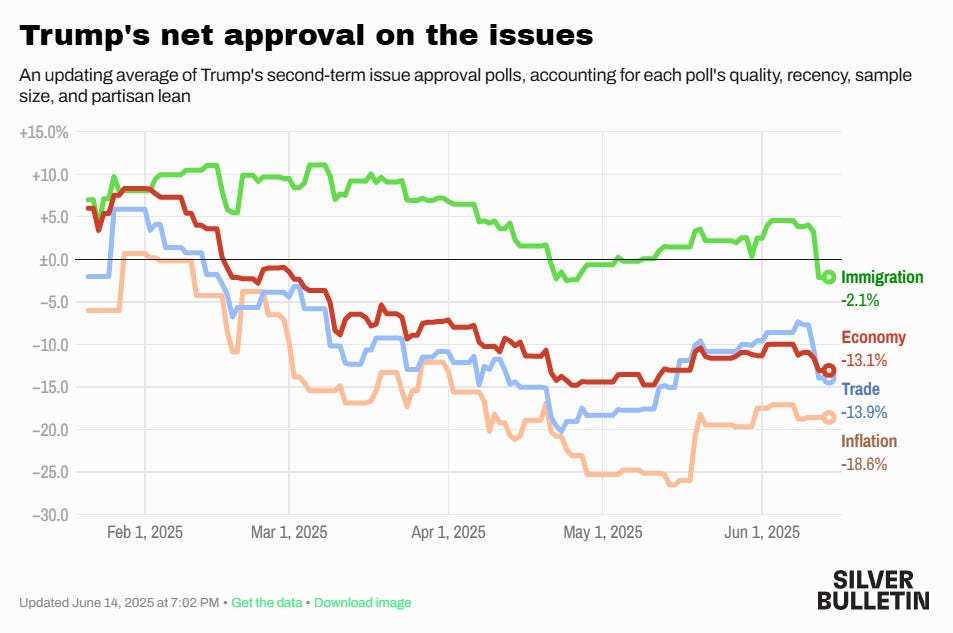
Americans are angry about illegal immigration, but what makes them even angrier is a President who acts like a king.
Nor is immigration the only issue where popular anger has forced Trump to back off of his most imperious decrees. On tariffs, “TACO” — the idea that Trump will always back off and “pause” his tariffs when the markets react too negatively — has become financial traders’ default assumption. Although Trump snapped at reporters who asked him about TACO, his Treasury Secretary Scott Bessent is already talking about another “pause” for the huge “Liberation Day” tariffs that were already paused until July.
And on immigration, this isn’t Trump’s first climbdown, either. Kilmar Abrego Garcia, a man Trump arrested in defiance of a court order and sent to a Salvadoran prison, has now been returned to America. At first, Trump looked like he might defy a Supreme Court order to facilitate Abrego Garcia’s return, but he ultimately overruled his rightist supporters and acquiesced. (Andry Hernandez Romero, the other prominent undeserving deportee to El Salvador, still hasn’t been heard from.)
Meanwhile, on foreign policy, Trump is still trying to cozy up to Russia, but has seemingly shelved the idea of withdrawing from NATO or ending support to Ukraine. Popular opinion, which is still strongly pro-Ukraine and anti-Russia, may be playing a role there. And all talk of seizing Greenland or making Canada the “51st state” — insane ideas that the American public rightfully despises — has seemingly vanished.
Essentially, Trump seems to be governing like…a President in his second term. Typically, two-term Presidents try to change the country during their first four years, but in their second term they tend to mostly reign over the status quo. Trump’s allies and supporters clearly hoped that Trump’s second term would be very different, because of the Biden interregnum — that Trump would come back riding a wave of popular anger and essentially have two first terms. But Trump is ruling like someone who’s wary of being unpopular, and so he’s chickening out on his most extreme ideas.
There was also a widespread expectation that the Tech Right would reinvigorate the MAGA movement, giving it a fresh infusion of desperately needed talent, energy, and ideas. It didn’t turn out that way. After DOGE failed to find significant government fraud, cut spending, or increase government efficiency by any noticeable amount, a wave of popular anger forced Elon to withdraw from government and focus on his businesses.
Trump and Musk then had a spectacular battle in the media a couple of weeks ago, trading barbs and accusations across their social media platforms. Elon was eventually forced to issue a groveling apology, but the damage to the cooperative relationship between the two men probably can never be repaired. The Tech Right will still be around, and will still be important, but its influence will be felt over the long term.
In other words, every single major piece of Trump’s second revolution now looks like it’s been stymied. Only his debt-exploding “Big Beautiful Bill” remains, and its popularity is also severely underwater. As in his first term, Trump’s grandiose but unworkable visions and the dark dreams of his rightist subordinates have foundered on the rocks of American public opinion. Democracy is working — the moderate, reasonable, freedom-loving country that you and I grew up in is rising up to protect itself.
When the Los Angeles protests started, Paul Krugman issued a clarion call to resistance, declaring that democracy itself was on the line:
What we’re actually seeing [in Los Angeles] is…An attempt to end politics as we know it, to deploy force to suppress dissent…The militarized response to the LA demonstrations and Trump’s warning that anyone protesting his military birthday parade (which millions probably will) will be “met with heavy force” aren’t about moving the poll numbers. They’re all about rejecting the idea that Americans have a right to oppose Trump policies…
If you’re a pundit who thinks that [Gavin Newsom’s anti-Trump rhetoric] is over the top, you’re part of the problem (and you have been wrong every step of the way.) If you’re a Democrat who wants to ignore the ongoing assault on democracy so we can talk about Medicaid — important as it is — you’re hiding your head in the sand.
This is the moment. Everything is on the line, right now.
Was Paul right? Well, yes and no. On one hand, I think he was certainly right about Trump’s authoritarian intentions (and I wrote as much back in April, when Trump temporarily flouted a Supreme Court ruling). The danger is real and ongoing; this was, and still is, an important moment in the fight against authoritarianism. No, we should not only be talking about Medicaid right now.
But Paul’s claim that Trump doesn’t care about public opinion appears to have been swiftly proven wrong. Trump did not shoot or jail the critics of Stephen Miller’s immigration sweeps; instead he backed down, and declared that he would change the policy. (Paul was also probably wrong to criticize tone-policing — the replacement of Mexican flags with American ones, and the overwhelming dominance of peaceful protests, will keep Americans focused on Trump’s abuses of power.)
This doesn’t mean Krugman and other liberals were wrong to warn the nation of looming authoritarianism, and to call for resistance. They were right to do so. But it was precisely because of that resistance that Trump backed down, and the dire warnings didn’t (yet) come to pass. America is facing an authoritarian movement, but it’s one that’s turning out to be far more irresolute and incompetent than we had dared to hope a few months ago.
But there’s another big piece of this that I think Paul is ignoring. Trump’s overall approval rating isn’t great, but popular approval of the Democratic party is even lower than approval of the GOP:

Dems will probably perform just fine in the midterms, due to low turnout in an off year; the Dems have a much more educated voter base, and educated voters vote much more consistently. But over the long term, Dems can’t just be the party of desperate last-ditch resistance against Trump; they also have to stand for something, and offer a vision of the American future that people actually want to vote for. Currently, they’re not yet managing to do that. I think liberal leaders need to put a lot more thought not just into resisting Trump, but also into rebuilding the Dems.
This weekend, I feel like I glimpsed a vision of what that rebuilding might look like. The patriotic defense of traditional liberal American values that I saw on display at the No Kings protest gave me more hope for our democracy than anything I’ve seen since I went to an Obama rally in 2008. It’s just a start, but it’s something.



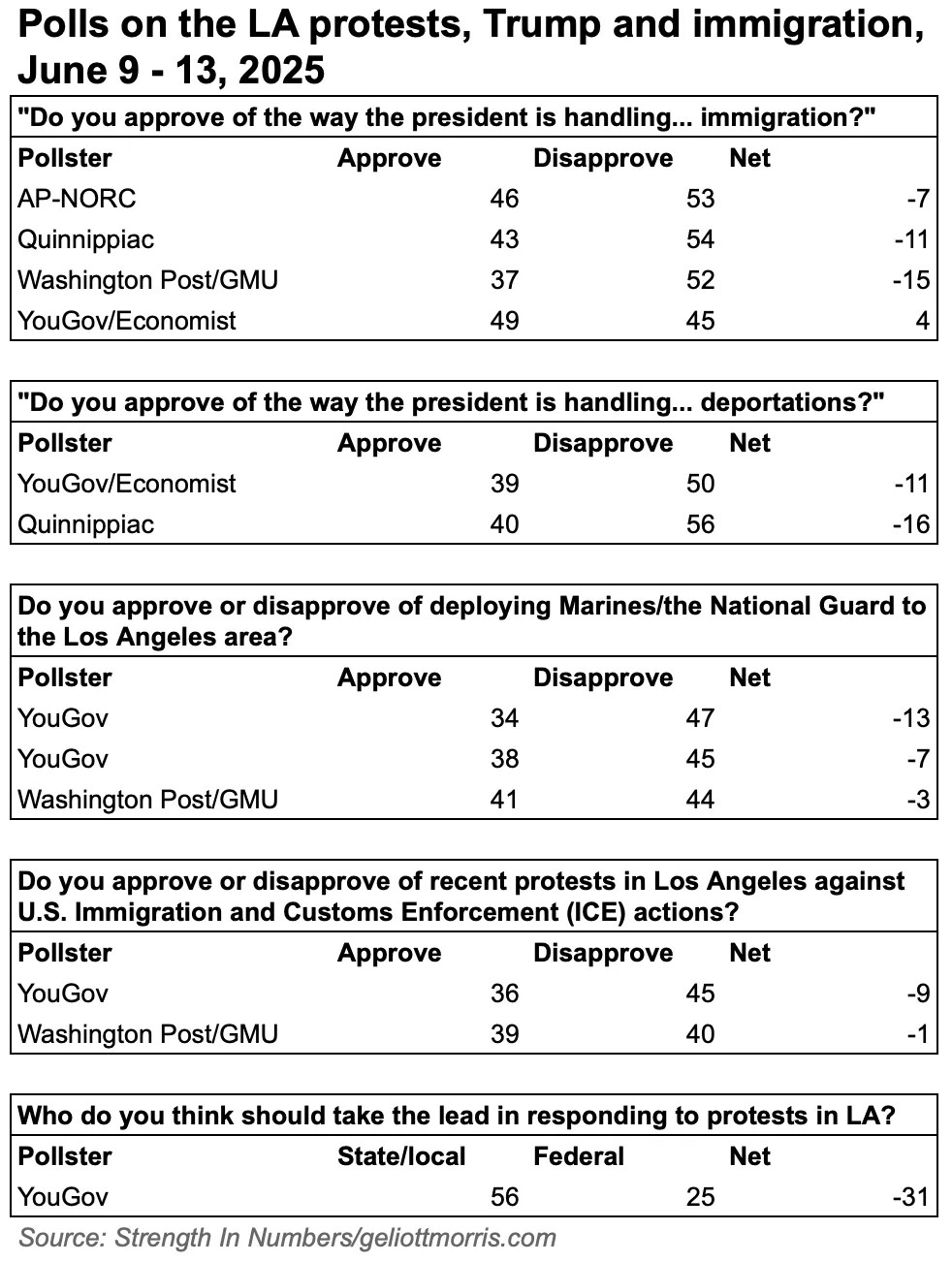

Great post. I feel like the final part of this post hearkens to your idea that the Democratic Party (and the centre-left) needs to reclaim patriotism from the right-wing, and re-establish the story that yes, actually, the things they promote are really quite patriotic.
"Essentially, Trump seems to be governing like…a President in his second term. Typically, two-term Presidents try to change the country during their first four years, but in their second term they tend to mostly reign over the status quo. Trump’s allies and supporters clearly hoped that Trump’s second term would be very different, because of the Biden interregnum — that Trump would come back riding a wave of popular anger and essentially have two first terms. But Trump is ruling like someone who’s wary of being unpopular, and so he’s chickening out on his most extreme ideas.”
I would strongly disagree here. Mr. Smith seems to be utterly ignoring the most insidious parts of Trump 2.0 - his manifest corruption, the continuing firing, neutralization, or dismantling of individuals and agencies most responsible for guarding against presidential overreach, weaponizing both the FBI and the DOJ against his political enemies, destroying our health care system, alienating our allies, defunding medical research, rampant, thoughtless gutting of governmental agencies. These are anything but ’normal’ presidential activities.
I too think the ’No Kings’ protests this past weekend were signs of a healthy democracy acting to protect itself, but democracy is a very long game, and the proof of this movement will depend on its sustainability and effectiveness at the ballot box, not it’s persistence in the streets.
I agree that someone has to come up with a plan and a message that can reach enough of us to alter the trajectory that has led to Trump 2.0, but I wish people would stop demanding that the Democrats need to come up with it. All of us as Americans need to come up with it.
I lived through the sixties when initial peaceful protests against racism and the war in Vietnam devolved into something else entirely. Americans have many virtues, but political patience has not always been one of them.
So I’m holding my breath. The plus size lady has not yet begun to sing.